 Movement to Work works with businesses and organisations that have the imagination to give young people who need more support a chance in the workplace through placements and other job opportunities. Together we have provided over 80,000 placements, and over 50% of those completing them have gone onto employment or back into education.
Movement to Work works with businesses and organisations that have the imagination to give young people who need more support a chance in the workplace through placements and other job opportunities. Together we have provided over 80,000 placements, and over 50% of those completing them have gone onto employment or back into education.
But, of course, many businesses need more than imagination, they must justify all of their decisions to investors, staff and customers. And the good news is they can. Recruiting this way makes financial sense through lower recruitment costs, ensures a high level of loyalty among incoming staff and improves the morale of existing staff. James Ashall, Chief Executive, Movement to Work provides an insight into how organisations like BAE Systems, BT, Marks and Spencer and the NHS have benefited from looking deeper into the labour market.
What’s in it for me?
Employing people is possibly the most difficult challenge organisations face. Getting the right people, with the right attitude and skills, is what all organisations aim for, but it can be a difficult task even with references, extensive CVs and facilities like LinkedIn that can give a much better idea of a person than was available in the past.
So, what about companies that are looking for younger people to train into the sort of colleagues that will be the business in several years’ time, who will have the skills that organisations need if they’re going to thrive or even continue to exist? Their CVs won’t have much on them, and they’ll have relatively little professional or academic experience, and many may not have yet learned ‘soft’ skills like punctuality and professional communication.
There is a big pool of young people out there, there always is; people in the 18-24 age group are much more likely to be unemployed than any other age group. Some of those young people will be pushed towards organisations by well-meaning, concerned parents, and some of these parents will even have links with the people that run those organisations. And some of the young people will be exceptionally well qualified, with degrees in humanities or arts subjects like media studies, history or sociology; not immediately obvious fits for businesses, but parental support power can help significantly.
So, that’s all good. But what about the rest?
- Those who are long-term unemployed,
- come from challenging or disadvantaged backgrounds,
- without families to support them financially or nurture their ambition as well as positive attitudes towards work and education?
- What about young people with mental-health issues, who are disabled or even young offenders?
What happens to them?
The good news is that 100s of organisations have pledged to provide work placements for these young people through Movement to Work, and they would argue that loyalty from those who never thought they would get a chance for a decent career makes them into model employees, whilst bringing numerous other advantages and hidden benefits.
In a 2018 Accenture report, commissioned by Health Education England, found that there was a 9% reduction in staff turnover, and reduced absenteeism, from young people recruited by the NHS via work-placement and employability schemes, which help young people develop workplace skills. This is part of the reason why, over a five-year period, it was determined that for every £1 spent on these schemes, a NHS trust could get that £1 back, plus an additional £2.50 in financial and economic benefits.
The Newcastle upon Tyne Hospitals NHS Trust’s (NUTH) Project Choice is offered to young people aged 16-24 in Newcastle with learning difficulties, disabilities or autism. To date 84% of the Trust’s Project Choice participants have gone on to into paid employment. The project is part of Health Education England’s programme to support the widening participation agenda and is a huge endorsement of the value to organisations of considering all young people for employment.
Disabled people and neurodiversity can be issues that many organisations fail to consider, or they don’t know how to access them or integrate them into current workforces. This is not only unfair to the young people, it means that those organisations are missing out on high-calibre candidates through ill-conceived preconceptions.
Certain neurodiverse conditions can lead to candidates being more suited to certain tasks. For example, Auticon is an international IT and compliance consulting business which hires consultants on the autism spectrum.
Ray Coyle, the chief executive of Auticon in the UK, said: “There are tangible business benefits to neurodiversity; Auticon consultants have abilities that set them apart from others. They have a genuine awareness for quality, outstanding attention to detail and intuitively recognise novel patterns in complex quantities of data.”
Employing young people who need particular support incurs relatively low recruitment costs as recruitment agencies are generally not involved and the HR interview process can be relatively light as so much is known about the candidates already.
Doing this also serves to drive morale within organisations. Employees increasingly want to feel that they are putting something back into society and coaching a young person can fulfil that desire.
David Pincott, who was a public affairs manager with BT, reflected on a scheme that BT ran alongside Movement to Work, where managers and others from around the company helped young people with CV writing and interview techniques:
“I remember one young man who told me in a mock interview that his weakness was that he ‘couldn’t read or write.’ I stopped the interview there to explore what he could say about that in real interviews and he described how had got himself onto an adult literacy course so that he could get a gas-safety certificate. I was amazed and humbled at the same time.
“Amazed that he talked about a ‘weakness’ that would have ruled him out of many jobs if he talked about it in an interview in such blunt terms, and humbled at his determination to get past this hurdle. This determination would be a strength for him in future interviews and a feeling for me going home that night of actually helping to make a difference.”
Championing the importance of diverse and inclusive workplaces and celebrating compelling personal success stories – often in the face of adversity – that ultimately lead to enhanced business performance, have been common themes that have emerged so often for Movement to Work.
Anastacia Jamfrey had become a mother at the age of 16 and had spent long periods unemployed, until she came across Movement to Work and started a placement at BAE Systems, which led to an apprenticeship position with the company:
“Because BAE Systems got to see me operating in the workplace I now work in engineering and have become a passionate STEM ambassador, even though I’ve no STEM qualifications!
“I remember being approached by a manager at a social function who wanted me to work in his part of the business; imagine going from being long-term unemployed to being sought out because someone had recognised my skills. My work placement did that, I would never have been considered on paper, I wouldn’t even have applied.”
Irfan Ayub had been exposed to criminal activities from an early age and had been expelled from school with no qualifications. He found a work placement through Street Elite, the youth development initiative that uses sport and mentoring to motivate young people.
Irfan said: “I’m now in a job where my colleagues must have degrees. I’ve got no qualifications on paper but by being seen first-hand in the workplace, it meant I didn’t need them. The people there saw something in me, more employers must recruit this way.”
Marks & Start Work-placement Programme
Marks & Spencer has been running a work-placement programme, Marks & Start, which helps people facing barriers getting into work, since 2004. It’s aimed at single parents, people with disabilities or health conditions and people who are homeless or at risk of homelessness. M&S also supports ex-forces people, service leavers and ex-offenders into work through employability programmes run with its partners.
Marks & Start has provided benefits for recruitment, development, engagement and retention, as well as building positive messages about M&S in the community and demonstrating its commitment to responsible business.
As part of Marks and Start, M&S’s Make your Mark programme provides access to a bank of work-ready young people who have been ‘tested’ before they even start a job; it reduces recruitment costs and those who do join are loyal and committed; it helps recruit and create a diverse and inclusive workplace that reflects local communities and, importantly, retains high-performing existing employees who support and develop programme participants – they feel their employer and their impact in work is making a difference to others’ lives.
The scheme offers development opportunities for existing employees to develop business critical skills such as communication, leadership, teamwork and resilience through taking on ‘buddy’ roles; 87% of buddies say the programme boosts their skills, loyalty and pride in working for M&S.
Ongoing evaluation continues to illustrate that 99% of buddies feel motivated by involvement in the scheme and 98% say it makes M&S a better place to work. Employees feel a pride and passion that their employer cares and go out of its way to support disadvantaged people in the community.
90% of participants say that the programme changed their lives, giving them the confidence to get back to work. Over 90% say that they now had a greater understanding of the world of work and have improved self-esteem and the confidence they needed to get back into work.
These quotes and statistics demonstrate that this programme benefits M&S. However, where Marks & Start has the biggest impact is for the young people themselves, their families, their futures and their communities, and this is something that drives many at the business to make the programme a success.
Sacha Berendji, retail, operations and property director at Marks & Spencer, said:
“The young people I’ve met on our Marks & Start programme have been very engaging and unbelievably positive about the M&S opportunity, and our retail teams love to see people so eager to learn, progress and be part of the M&S family, it really raises morale. Employability programmes like this help to put the ‘heart and soul’ into M&S, creating a deeper connection with the community where our customers live and makes us a better business as a result.”
Skills Shortages In The UK
Ironically, another big issue facing the UK currently, aside from youth unemployment, is a skills shortage.
Three in five firms says the UK’s skills shortage worsened in the last year and more than half expect the situation to further deteriorate, according to research from the Open University from 2018. Three in five firms says the UK’s skills shortage worsened in the last year and more than half expect the situation to further deteriorate, according to the research.
David Willet, The Open University’s corporate director said:
“Organisations need to take a more sustainable, long-term approach, building talent through training rather than buying it in.”
The economy is working at almost full employment for older age groups and a number of sectors are running out of people with the skills the UK desperately needs.
There are some astonishing success stories for organisations that have looked deeper into the labour market, not only for the young people involved, but for the future of those businesses as they ensure they build the skills needed to expand and maintain healthy businesses.
It’s critical for the UK that at this this time of uncertainty, at the very least we can help young people who haven’t been given the opportunities that many take for granted, but we must also consider relevance to business and organisational objectives too.
We know for certain the benefits because so many of the organisations that recruit via Movement to Work and our partners continue to do so, and not just because their current workforces appreciate it and it’s good for society, but it also makes commercial sense.
James Ashall, Chief Executive, Movement to Work
This article was first published at FE News



 The Government’s new funding, promised in the Spring Statement, must be aimed at root causes of youth crime. Movement to Work, IHEART & London Youth are calling on employers to provide more opportunities for all young people and for Government to reinvest in the UK’s youth services. Providing a future through positive mentorship, hope and ambition will have the greatest impact
The Government’s new funding, promised in the Spring Statement, must be aimed at root causes of youth crime. Movement to Work, IHEART & London Youth are calling on employers to provide more opportunities for all young people and for Government to reinvest in the UK’s youth services. Providing a future through positive mentorship, hope and ambition will have the greatest impact
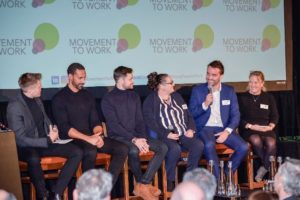 The Awards Evening saw young MtW graduates, employers, charity and delivery partners come together to celebrate the outstanding and impactful achievements that took place over the course of 2018. The theme of mentorship was one that ran throughout the course of the evening – fitting as Movement to Work is about positively impacting young people, in order that they can unlock their talents and fulfil their potential through the world of work.
The Awards Evening saw young MtW graduates, employers, charity and delivery partners come together to celebrate the outstanding and impactful achievements that took place over the course of 2018. The theme of mentorship was one that ran throughout the course of the evening – fitting as Movement to Work is about positively impacting young people, in order that they can unlock their talents and fulfil their potential through the world of work.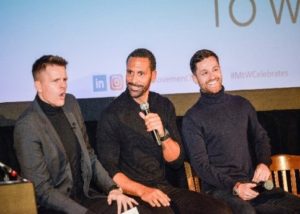

 This year’s CEO Summit brought together chief executives and other leaders of some of the UK’s largest organisations, youth outreach partners and young people who had gone through employability schemes found through Movement to Work. The aim of the discussions was primarily to explore the issues facing young people who need extra support to get on the career ladder.
This year’s CEO Summit brought together chief executives and other leaders of some of the UK’s largest organisations, youth outreach partners and young people who had gone through employability schemes found through Movement to Work. The aim of the discussions was primarily to explore the issues facing young people who need extra support to get on the career ladder. However, there was positive news, and this was how young people who have had extra challenges in their lives can become great employees, with huge talent and loyalty. And the young people at the discussions were great examples. There was much discussion of the value of mentorship, particularly around how these young people were able to influence positively other young people who were not obvious candidates for some roles.
However, there was positive news, and this was how young people who have had extra challenges in their lives can become great employees, with huge talent and loyalty. And the young people at the discussions were great examples. There was much discussion of the value of mentorship, particularly around how these young people were able to influence positively other young people who were not obvious candidates for some roles.


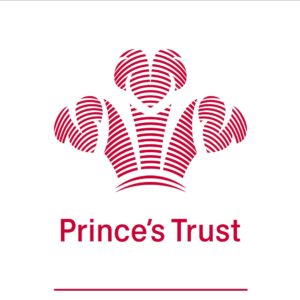
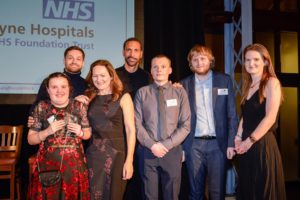
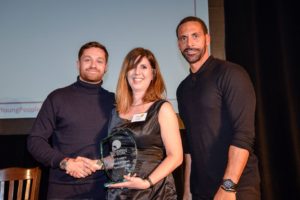
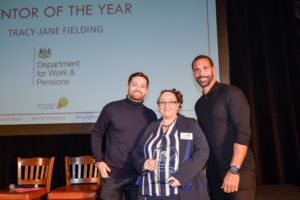 Tracy-Jane Fielding
Tracy-Jane Fielding 
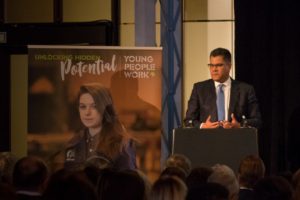 Government reaffirms the importance of Movement to Work
Government reaffirms the importance of Movement to Work


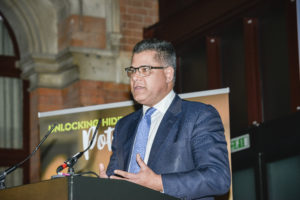 Alok Sharma, Minister of State for Employment, pays tribute to Movement to Work and its partner employers for delivering skills and prospects to young people who need extra support to get on the career ladder
Alok Sharma, Minister of State for Employment, pays tribute to Movement to Work and its partner employers for delivering skills and prospects to young people who need extra support to get on the career ladder
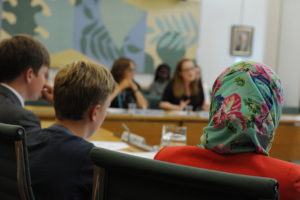 UK work-placement charity supports Youth Select Committee’s report into work placements
UK work-placement charity supports Youth Select Committee’s report into work placements
 Give all young people the gift of experience this Christmas
Give all young people the gift of experience this Christmas